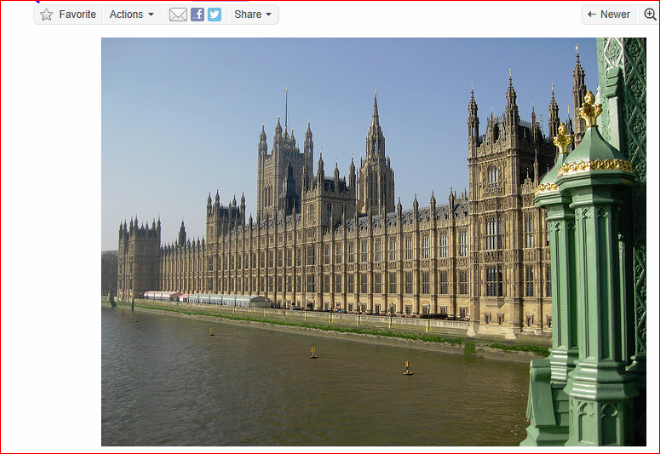(Image by UK Parliament)
City University library was well represented at the House of Commons Library visit in February. Attendance was prompted by link to faculty, a general interest in political history, and not least the wonderfully evocative interior of the library and its cloisters. I was particularly interested in getting a better idea of the collection subjects, and its location, as well as using the visit as a gauge for procedural standards. In this sense the day was both informative and enjoyable.
We entered the library via Portcullis House, the modern building facing the embankment that received a lot of flak when it was first built for being ugly, yet I’ve always admired for its appropriately solid, impenetrable looking exterior. Here we spent the morning attending a series of short talks about the library; see below…
During the break we were invited to meander around an intriguing exhibition, curated by the library staff, displaying items from the collection that indicate alternative sides to politicians’ activities, e.g. a novel by Churchill, and other gems including weather maps, maiden speeches, and evidence of MP’s as playwrights, novelists, poets and essayists.
Lunch offered an opportunity to mingle and meet other interested parties, spend more time looking at the exhibition, and to enjoy the remarkably good collection of portraits of past and present MP’s gracing the upper level of Portcullis House before assembling for a tour of the library.
It was interesting to see how the library connects to both Portcullis House and the Palace of Westminster. The view is altogether far more appealing than the one gained from the road. As we walked the short way to the palace entrance, stone quads and painted corridors were glimpsed, broken a little by the pleached limes/hornbeams edging the suggestion of a formal garden. Contrary to the medieval feel of the place, the library consists of a suite of rooms designed by Barry and Pugin (V&A) in the mid-19th century, although the library dates back 200 years, and you sense this as you look out at the river over which it looks. “Its focus is on meeting the information needs of parliamentarians today, and is still used for the purpose for which it was created”. In the librarian’s words…
“The library rooms, being situated closely to the chamber of the House of Commons indicate the value placed by the house on knowledge and learning. The library offers members a unique opportunity to be well informed, through books and online resources, and the quiet sanctuary for reading and reflection, and also in terms of experts offering research, information, and analysis on all aspects of a Members work. The services are delivered close to where the members are. This proximity and availability to wherever a member is, and whenever the service is required, is an essential aspect of the service, be it on the web, over the telephone or through personal contact. All of the library’s work is for individual members in support of their parliamentary duties and is provided on an impartial and confidential basis. It is in great demand, with at least 75 per cent of the members being regular customers. The library is part of the Department for Information Services which also provides information services for the public including school children and visitors to parliament”.
I wasn’t sure what to expect re the library’s shelves, presuming the stacks would be more reminiscent of a law library with nondescript, uniform jackets and coverings. The delight therefore was to find stacks filled from floor to ceiling with titles indicating countries, places, people/s, periods, men, women, children, from all over the world; interspersed with a fair amount of biography, of the great and the good, and the not so good. I suppose you’d call it ‘History’, past, present, and future in its widest sense, and discovered that I found such a collection both encouraging and exciting.
Further information can be gained from visiting the website www.parliament.uk/library
More information relating to resources and procedure
The library provides:
- Pre-prepared briefings, i.e. Standard Notes – Covers FAQ’s and topical issues
- Historical Hansard
- Bicameral contracts
- Newspapers
- Customer/Enquiry Services
The library uses:
- British National Bibliography
[“The British National Bibliography (BNB) lists the books and new journal titles published or distributed in the United Kingdom and Ireland since 1950. It also lists forthcoming book titles and hand-held electronic publications e.g. CD-ROMs, deposited with the Legal Deposit Office since 2003”].
The library Subject librarians work within research teams to provide the following…
- News
- Law
- Statistics
- Human rights
There’s a central share point for library staff, and the Collection Management System used is SirsiDynex ‘Symphony’, which is used in both houses.
The library follows:
- Marc 21500
- A modified AACR
- Dewey Decimal 21
The library’s collection/document Management Policy accommodates hard copy and online resources, and there’s a shared Intranet with the House of Lords, to engage colleagues and manage user expectations.
Awareness and endeavour for savings focus upon…
- Reduced duplication
- Regular review of subscriptions
- Collection of Usage figures – Restricting access
- Negotiating discounts – Working with the House of Lords library
Marketing follows:
- Corporate Strategy
- Accessibility
- Communication – includes the general public
Digital Outreach provides:
- Real time news updates
- Bills online
- Social media (Twitter) – UK Parliament, House of Commons
- Partnerships – Select Committee
- You and your MP – Procedural information team and publications
Work Shops:
- Public Bills – How a bill becomes an Act
- Select committees – Covers campaigns
Regional Outreach:
- Training for Organisations –
parliamentoutreach@parliament.uk/trainthetrainer
parliamentoutreach@parliament.uk/universities
parliamentoutreach@parliament.uk
Intranet.parliament.uk provides:
Online resources – A-Z legal databases arranged by theme, plus…
- Ebsco
- JSTOR
- Cambridge Journals online
- The Commons library catalogue
- Resources to understand case work
Go to the topics link on the parliament site for Lords library publications.
